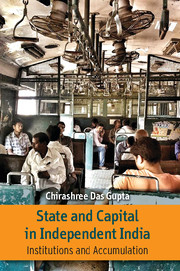Book contents
- Frontmatter
- Dedication
- Contents
- Figures
- Tables
- Acknowledgements
- 1 Introduction
- 2 Globalization and Neoliberalism: The Context and the Debate
- 3 State and Capital in Independent India: The Problematic
- 4 Policy Regimes and Macroeconomic Outcomes: 1947–1966
- 5 Institutionalization of the Regime of Capital in India: 1947–1966
- 6 Continuity and Change in Capital Accumulation: 1966–1980
- 7 Sources of Accumulation: State Intervention and Non-intervention
- 8 ‘Old Oligopolies and New Entrants’ in the Pharmaceutical Sector
- 9 Conclusion
- Bibliography
- Index
3 - State and Capital in Independent India: The Problematic
Published online by Cambridge University Press: 05 September 2016
- Frontmatter
- Dedication
- Contents
- Figures
- Tables
- Acknowledgements
- 1 Introduction
- 2 Globalization and Neoliberalism: The Context and the Debate
- 3 State and Capital in Independent India: The Problematic
- 4 Policy Regimes and Macroeconomic Outcomes: 1947–1966
- 5 Institutionalization of the Regime of Capital in India: 1947–1966
- 6 Continuity and Change in Capital Accumulation: 1966–1980
- 7 Sources of Accumulation: State Intervention and Non-intervention
- 8 ‘Old Oligopolies and New Entrants’ in the Pharmaceutical Sector
- 9 Conclusion
- Bibliography
- Index
Summary
The purpose of this chapter is to locate the methodological framework of this book within the debates on the role of the state and state– society relations in capitalist transition. This chapter is divided into five sections. Section 3.1 addresses the academic debate on the relationship between state and capital in India. The problematic of studying the post-independence Indian state is developed through a critique of the different analytical frameworks through which different strands of social science have studied or abandoned the study of this relationship. Section 3.2 is devoted towards the development of various aspects of the problematic of the relationship between the state and capital in India. Section 3.3 lays out the methodological framework for this exercise. Section 3.4 elaborates on sources and data used for the exercise. Section 3.5 elaborates on two dimensions of the problematic – time and territoriality.
Culturalism, ascent of neoliberalism and ‘monoeconomics’
Before we put forward a detailed methodological framework, it is necessary to recapitulate the wider methodological developments in social science relevant to our task within which the debates in political economy of the Indian context took place. Shifts in ideological premises in the making of the shift to neoliberalism cannot be assessed without establishing the context of such changes within and across disciplines as political economy inherently encompasses an inter-disciplinary approach.
After the Communist debacle in Eastern Europe and the growth of self-confidence of countries allied to the US (Yates, 2003), the political debate that emerged to dominate academia in and on India was in the first place not about economics. The intense debate that developed began with critical perspectives on Indian historiography and then expanded across other disciplines in the social sciences. Many academic practitioners of social science working on India started moving towards post-structuralist perspectives. Some of them in due time embraced a post-colonial/post-modern perspective sometimes premised on a false notion of indigeneity (e.g., Nandy, 1989a, 1989b) and based their contributions in the upcoming field of culture studies to reject the validity of any kind of universal ideology of emancipation and with that a systemic understanding of capitalism (Qadeer and Hasan, 1987).
These trends have been attributed by some critics to the tendency of certain scholars to appeal to a metropolitan and selective academic audience in India.
- Type
- Chapter
- Information
- State and Capital in Independent IndiaInstitutions and Accumulations, pp. 44 - 77Publisher: Cambridge University PressPrint publication year: 2016



